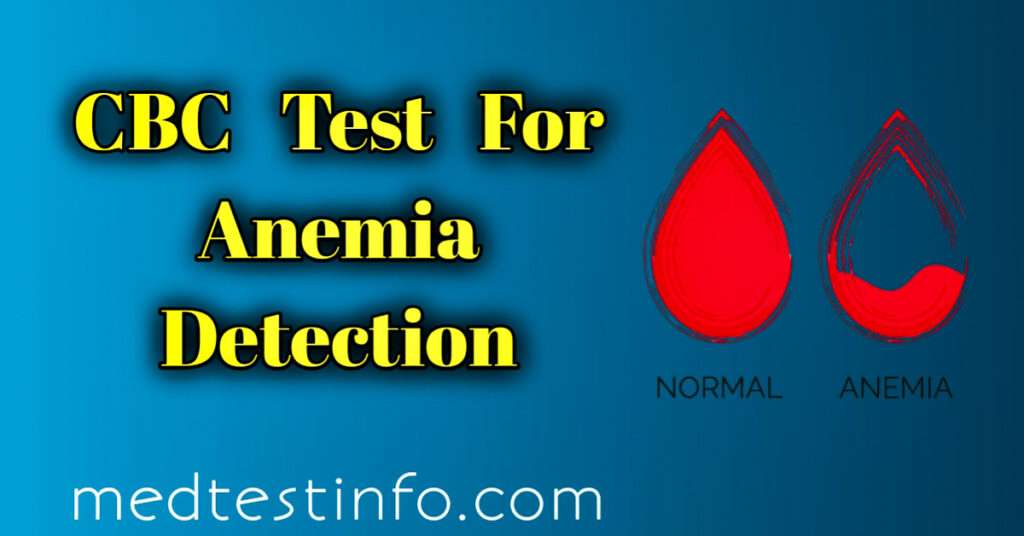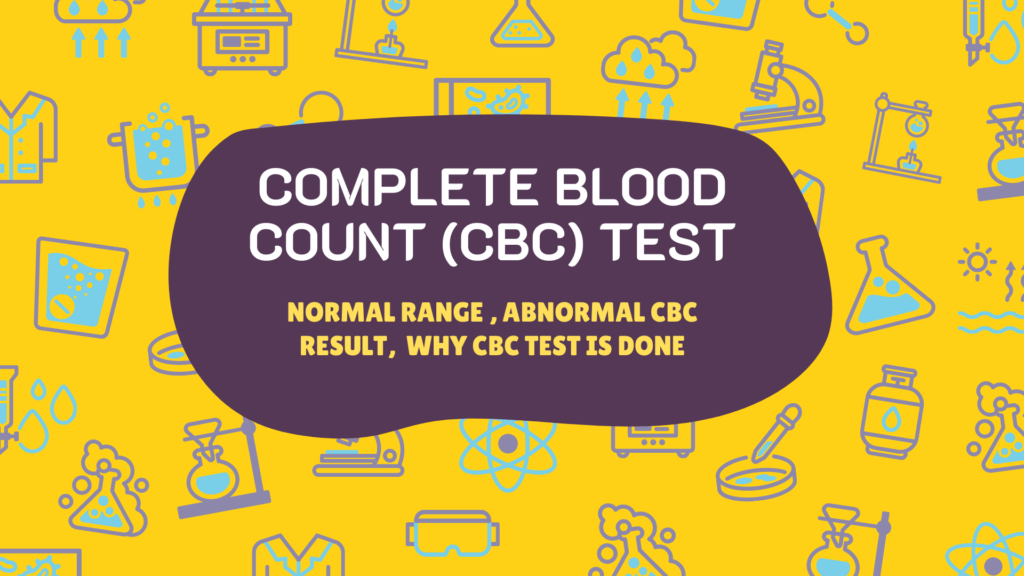
Overview
Complete blood count, i.e., CBC, is a basic test. Whenever you go to the doctor, he focuses more on the CBC test, which is undoubtedly included in the list of tests. This is a great tool that gives you complete details about your health.
CBC test is an essential and basic test to check your overall health. Have you ever thought about this after seeing the test results? What is the meaning of that specific number? Or what the test reveals about my health. That’s why, in this article, I have given overall information about the CBC test. After reading this article, you will understand your own CBC test easily.
The CBC And Your Overall Health
One of the essential things to understand about the CBC test is that it is not a test for a specific disease. Instead, it provides a comprehensive overview of your blood health. The doctor also looks at your medical history, overall health, and symptoms and uses this information to decide or suggest more specific tests.
If the result of your CBC test is slightly abnormal, it is natural to feel anxious. However, remember that many things can affect your CBC test result. It could be something as simple as your daily routine or a minor infection affecting the outcome. You must consult your doctor for further guidance and support in such cases.
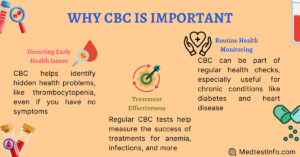
Why Is It Important?
The complete blood count (CBC) test is often the doctor’s first attempt to check your health. But why CBC test is so important? Let us understand this as points based on personal experience.
Catching Early Signs Of Illness
I once went to the doctor because I was experiencing dizziness, blurred vision, and feeling faint. The doctor ordered some tests, including a CBC. The rest of the test results are normal, and the CBC is almost normal, but there is some platelet issue. According to the doctor, my blood components required microscopic examination. The final diagnosis was that I had Thrombocytopenia, which I cannot know without getting a CBC test.
The CBC test reveals the progress of your illness. As long as the condition is severe, you are informed beforehand. Whether it is anemia or some other serious condition, it helps your doctor to identify the problem quickly.
Monitoring Your Overall Health
Even if you are feeling well, CBC tests can be crucial in monitoring your overall health. If you are managing chronic conditions like diabetes or heart disease, these tests are essential for you. Your doctor will probably recommend them regularly to help you maintain your health.
To Check On Medical Treatment
Doctors also use CBC tests to monitor the effectiveness of treatment. If you are getting treatment for a disease like anemia, infection, or even cancer, then your doctor can order a CBC test to check the result of your treatment. For example, if you take some supplements for anemia, your doctor will check your CBC test to see whether the number of red blood cells and hemoglobin increases.
In my case, the doctor also gave me some supplements and conducted regular, complete blood count (CBC) tests. These tests not only monitored the progress of my treatment, but also reassured me that my condition was improving and that I would recover in due time.
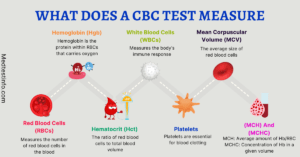
What Exactly Does A CBC Measure?
A complete blood count (CBC) is one of healthcare professionals’ most popular and valuable diagnostic tests. This test assesses several critical blood components, which can provide helpful information about your general health. A CBC test can show various health issues, such as infections and problems with the blood. You might need a CBC test if you have particular health concerns, such as unexplained fatigue, frequent infections, or a family history of blood disorders. Here’s a detailed look at the essential components assessed in a CBC test and what they show about your health:
Key Components Measured During A CBC Test
Red blood cells (RBCs): Red blood cells (RBCs) serve an essential role in your body by transporting oxygen from your lungs to all of your cells and returning carbon dioxide for you to expel. The amount of RBCs in your blood is critical for providing appropriate oxygen to tissues and organs. A low RBC count frequently suggests anemia, in which the body lacks enough healthy RBCs to carry adequate oxygen, resulting in weariness, weakness, and paleness. However, a high RBC count may point to dehydration, chronic lung disease, or heart disorders in which the body creates more RBCs to compensate for low oxygen levels.
White blood cells (WBCs): White blood cells serve as the invisible soldiers of your immune system, defending your body against infections, viruses, and bacteria. Their Increase (leukocytosis) could signal an infection, inflammation, or stress. But don’t worry; your body’s defense processes are at work. Your WBC count may also rise in certain disorders like allergies, autoimmune diseases, or leukemia. A decrease in WBCs (leukopenia) might make you more susceptible to infections, but it’s often because of manageable factors like bone marrow abnormalities, chemotherapy, or certain drugs.
Platelets Or Thrombocytes: These are the unsung heroes of blood coagulation. When you have an injury, these tiny cell fragments rush to that site, forming a clot and stopping the bleeding. A low platelet count (Thrombocytopenia) could make blood clots harder, increasing the risk of heavy bleeding, bruising, or spontaneous bleeding. Conversely, a high platelet count (Thrombocytosis) could lead to abnormal blood clots, raising the risk of severe illnesses like stroke, heart attack, or deep vein thrombosis (DVT).
Hemoglobin: It is a vital protein found in red blood cells. It plays a crucial role by grabbing oxygen from the lungs and carrying it to various tissues and organs. It facilitates the transport of carbon dioxide to the lungs for expiration. A low hemoglobin level frequently implies anemia, which can cause fatigue, shortness of breath, and dizziness. High hemoglobin levels might suggest dehydration or polycythemia vera, a disorder in which the body generates an abnormally large number of red blood cells.
Hematocrit: It is the percentage of red blood cells in your blood. It determines your blood’s viscosity (thickness) and provides information about hydration and oxygen-carrying capability. A low hematocrit signifies anemia, whereas a high hematocrit represents dehydration or polycythemia, in which your body produces excess red blood cells.
Mean corpuscular volume (MCV): MCV represents the average size of your red blood cells. This component aids in the diagnosis of anemia and other blood diseases. A high MCV (macrocytic anemia) may indicate vitamin B12 or folic acid deficiency. A low MCV (microcytic anemia) may suggest iron deficiency anemia or thalassemia, a hereditary condition inhibiting hemoglobin production.
Normal Results
A normal CBC result reveals that red blood cells, hemoglobin, hematocrit, and platelets fall within expected reference ranges, point out effective oxygen transport and coagulation processes.
White Blood Cell Components Normal Ranges
Normal values reflect a well-regulated immune response, ensuring sufficient protection against infections and inflammation. Variations can point out the presence of infections, allergies, or immune disorders.
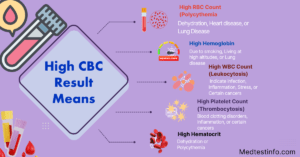
What Does An Abnormal CBC Result Mean?
An unusual result is not always indicative of a serious medical condition. An unusual result doesn’t mean there’s a serious health issue. Sometimes, it points towards something that requires further investigation. CBC results can reveal minor reasons for abnormality like dehydration and primary reasons like anemia, cancer, etc.
The essential key is not to panic, but to work with your doctor for a thorough examination of your health.
We’ll determine your abnormal CBC result and how it may affect your health.
Abnormal Red Blood Cell (RBC) Count
High RBC Count
The following conditions may arise whenever the number of red blood cells increases.
- Dehydration
- Heart disease
- Polycythemia Vera: A blood disease in which the bone marrow makes too many red blood cells (RBCs).
Low RBC Count
The following conditions may arise whenever the number of red blood cells in our body decreases.
- Anemia
- Bleeding
- Bone marrow disorders
- It also points out nutrient deficiencies like iron, vitamin B12, and folate deficiency.
Abnormal White Blood Cell (WBC) Count
High WBC Count (Leukocytosis)
A high WBC count is also called leukocytosis.
Here are some situations that might occur when there is an increase in white blood cells in our body;
- Infection
- Inflammation
- Stress
- Leukemia
- Immune system disorders
Low WBC Count (Leukopenia)
A low WBC count is also called leukopenia.
Here are some conditions that can occur when our body has a lower count of white blood cells;
- Bone marrow problems
- Autoimmune diseases
- Severe infections
- Effect of certain medications, such as chemotherapy
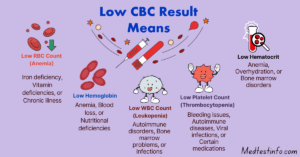
Abnormal Platelets Count
High Platelet Count (Thrombocytosis)
A high platelet count is also called thrombocytosis.
Following are the conditions that may arise when platelets increase in our body;
- Chronic inflammation
- Certain cancers
- Thrombocythemia: A bone marrow disorder
Low Platelet Count (Thrombocytopenia)
Low platelet count is also called thrombocytopenia.
The following conditions may occur when platelet levels decrease in the body;
- Viral infections
- Autoimmune diseases
- Bone marrow disorders
- Side effects of certain medications
- In my situation, a low platelet count resulted in a diagnosis of thrombocytopenia.
Abnormal Hemoglobin Levels
High Hemoglobin
The following conditions may arise because of high hemoglobin;
- Dehydration
- Smoking
- Living at high altitudes
- Conditions like polycythemia Vera
Low Hemoglobin
Low hemoglobin can lead to the following conditions;
- Anemia, which might have caused by iron deficiency
- Chronic disease
- Bone marrow issues
Abnormal Hematocrit Levels
High Hematocrit
High hematocrit levels may lead to the following conditions;
- Dehydration
- Lung disease
- Polycythemia Vera
Low Hematocrit
The following conditions may arise because of low hematocrit levels;
- Anemia
- Blood loss
- Bone marrow disorders
Abnormal Mean Corpuscular Volume (MCV)
High MCV
The following condition may arise because of high mean corpuscular volume (MCV);
- Elevated levels of red blood cells may suggest a deficiency in vitamin B12 or folate.
- Liver disease
Low MCV
The following condition can develop due to decreased mean corpuscular volume (MCV);
- Red blood cells that are smaller than usual are often a result of iron deficiency anemia.
- Thalassemia
Abnormal White Blood Cell Differential
- High Neutrophils: This may suggest a bacterial infection, stress, or inflammation.
- Elevated Lymphocytes: This may mean a viral infection, leukemia, or lymphoma.
- Raised Monocytes: This could be a sign of chronic infections, autoimmune disorders, or blood disorders.
- High Eosinophil levels often point to allergic reactions, asthma, or parasitic infections.
- Increased Basophils: This may indicate allergic reactions, inflammation, or leukemia.
Frequently Asked Questions (FAQs)
A Complete Blood Count (CBC) test checks the general health of your blood and can find many problems, like infections, anaemia, and other blood-related issues. It checks things like the amounts of red blood cells (RBCs), white blood cells (WBCs), platelets, haemoglobin, and hematocrit. These numbers help doctors determine how well your immune system works, how much oxygen is in your blood, and how well your blood clots. These things can show if you have health problems that need more research.
Normal numbers for CBC depend on the person’s age and gender, but here are some general ranges to keep in mind:
Red blood cells (RBCs): 4.7 to 6.1 million cells/mcL for men and 4.2 to 5.4 million cells/mcL for women
White blood cells (WBCs): 4,500 to 11,000 cells/mcL
Platelets: between 150,000 and 450,000 per microliter
It should be between 13.8 and 17.2 g/dL for men and 12.1 to 15.1 g/dL for women.
Blood count: 40.7% to 50.3% for men and 36.1% to 44.3% for women
After reviewing your medical history, the doctor will determine whether these numbers are within a healthy range or if you need more tests.
No, a CBC test does not check how well the thyroid runs. A CBC looks at many parts of the blood, but thyroid function tests, like checking TSH (Thyroid-Stimulating Hormone) and T4 (Thyroxine) levels, are different. In addition to the CBC, your doctor may order special thyroid blood tests if you have symptoms that point to a problem with your thyroid.
No, a CBC does not directly tell you how well your liver or kidneys work. To check the liver’s health, tests like the liver function test (LFT) are needed to determine how many enzymes and proteins it makes. Doctors often use creatinine and blood urea nitrogen (BUN) tests to check on the health of your kidneys. However, if there are problems with a CBC, more tests may be needed to see if there are signs that the liver or kidneys are not working correctly.
If you get a CBC, it can find early signs of major health problems like infections, anaemia, blood disorders, and sometimes even leukaemia or other blood cancers. If the counts of white blood cells, hemoglobin, or platelets are not average, it may mean that something more important needs to be looked into. However, a CBC is generally only the first step. If it shows anything unusual, tests are usually needed to find the exact cause.


